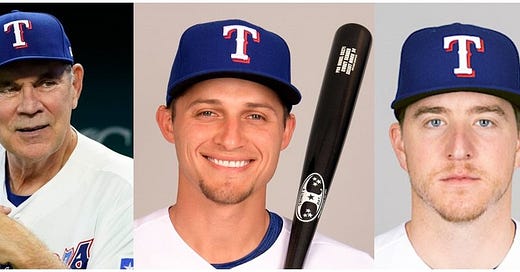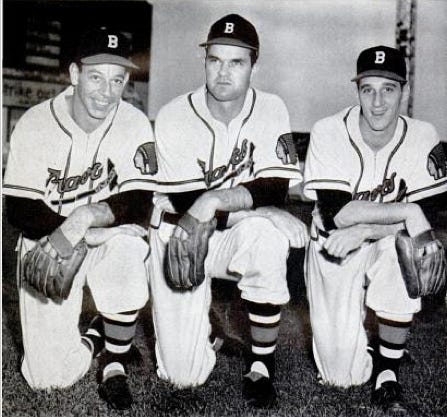Backroads and Ballplayers #30
Stories of the famous and not-so-famous men and women from the days when baseball was "Arkansas' Game." Always free and always short enough to finish in one cup of coffee.
World Series 2023 - 1948
Important…During the winter, Backroads and Ballplayers Weekly will only be available through free subscriptions or on the Backroads and Ballplayers Facebook page. Always free!
Looking Back, I told you so!
Do you remember back in April when I posted the subscriber’s only “Pick the World Series Champion” contest? Maybe you recall that I predicted that the Texas Rangers would win in the 2023 World Series in five games. You may also recall that I also envisioned the guys from Arlington would win every playoff road game and wrap the Fall Classic in Game Five with that bad dude of the bullpen, Josh Sborz, nailing down the title with a 31-pitch save.
I knew “Sborzy” would be ready, and manager Bruce Bochy was saving him for just such an occasion. Choosing the right reliever is much like handicapping horses, at which I am equally adept. You have to know they are ready. I knew Bochy had given Josh four save chances in the regular season, and he had blown all four. He was, of course, ready.
I suspected the Rangers would not need Max Scherzer after they liberated Jordan Montgomery from the Cardinals, and of course, Travis Jankowski was a bomb ready to explode if something happened to say… Adolis Garcia.
Of course, you know I predicted none of those things. Baseball has a way of making seemingly impossible things come true. After winning six decisions and losing seven in the regular season with a 5.50 ERA and four blown saves, Josh Sborz was on the mound when the Texas Rangers won their first World Series. You really have to love this game.
Obviously, I am much better at reporting that the Deans won all four games of the 1934 World Series than predicting what might happen in 2023. Researching history is easier than seeing the future. I was not alone in thinking one of the best regular-season teams was likely to prevail in a short series. Was this World Series an anomaly or a trend?
I did write about the Arizona Diamondbacks in several mid-summer essays. All those stories were about the amazing play of former Razorback Dominic Fletcher who was called up in late April. Dom hit .404 in his first 45 at-bats, with a couple homers and 13 RBIs. I predicted he was in the “show” for good. I saw little promise in the D-Backs as a team. By June, Dom was back in the minors and although he did get another short trial later in the summer, I hardly noticed the Diamondbacks again, until about late October! They did have a good rookie outfielder, but it wasn’t Fletcher.
So, who knew?
Congratulations to the following subscribers who chose the Texas Rangers to be World Series Champs back in April. I planned to draw a winner from those who made the correct choice, but I can’t bring myself to choose just one winner. I am still deciding how to do this. Yes, a private cruise with Taylor and Travis is out.
Stephen Copley
Kenny Nichols
Scott Goode
Terry Johnson
Mitch Walton
Steve Mercure
Rodney Todd
Johnny Wilson
Giving Johnny Sain His Due…
"It's not so much my pitching people know, but that little poem about me and Johnny Sain with the forty-eight Braves." - Warren Spahn
As I put away my World Series notes, I realized I had written too much about the sad story of Gene Bearden, his heroism in the 1948 World Series, and his fabricated heroism in World War II. Conversely, I had neglected the Arkansan who deserved praise for one of the outstanding pitching seasons in baseball history.
Spahn & Sain by Gerald V. Hern Published: Boston Post (09-14-1948)
First, we'll use Spahn
then we'll use Sain
Then an off day
followed by rain
Back will come, Spahn,
followed by Sain
And followed
we hope
by two days of rain.
Johnny Sain was simply the best pitcher in baseball that season 75 years ago when the National League Boston Braves met the American League champion Cleveland Indians in the Fall Classic. Poetically, the Braves had won that NL pennant with Spahn and Sain and some prayers for rain. Spahn does get some credit for that drive to the pennant, but his 15 pitching wins, and 257 innings pitched, fall far short of Sain’s numbers.
The rainouts were insignificant, and although Spahn pitched well, Vern Bickford also won four complete-game decisions down the stretch, but “Bickford” hardly seems to fit the rhyme. Johnny Sain won eight games in the last month of the season, and the Braves coasted home six and a half games ahead of the Cardinals.
Johnny Sain 1948: By the numbers
John Franklin Sain of Havana, Arkansas, was 30 years old in 1948. He had pitched 85 games for Osceola and Newport over four years in the Northeast Arkansas League and 100 more in three minor league seasons in Nashville. Sain lost three full seasons to military service, and unlike Gene Bearden’s WWII fabrication, Sain’s story of learning to fly fighter planes and training pilots in World War II is true.
Sain had been a 20-game winner each year after returning from active duty, and at a time when pitching victories were a trusted indicator of success, he had posted the most cumulative wins of any major league pitcher in the three years after the war. He was second in the National League in wins for both the 1946 and 1947 seasons, and he finished fifth in the MVP vote in 1946. Even before his phenomenal 1948 year, Johnny Sain was recognized as one of the best pitchers in the game.
In 1948, he led the league in wins (24), games started (39), innings pitched (314.2), and complete games (28). He pitched in two World Series games, winning Game One in a memorable 1-0 duel with Bob Feller and losing Game Four 2-1. He pitched 17 innings in the Series with a 1.06 ERA. In classic “What Might Have Been,” Sain could have returned on short rest in Game Seven before Bearden’s movie-script performance ended the Series in six games.
After an off-year that saw him win only 10 games in 1949, Sain was a 20-game winner again in 1950. He was traded to the Yankees for Lew Burdette late in 1951, in a trade that worked out for both teams. Burdette joined Spahn at the head of a rotation that won a World Series in 1957 for the Milwaukee Braves.
Sain became an excellent relief pitcher for New York and collected three World Series rings. Before saves were a part of pitching stats, Sain led the league in the yet-to-be-invented category in 1954.
Johnny Sain obviously pitched in a very different time. It was a period when Wins, Innings Pitched, and Complete Games were very much a part of a starting pitcher’s evaluation. In 1948, his 28 complete games were more than the 2023 complete games of Gerrit Cole, Blake Snell, Spencer Strider, and Zac Gallen, combined! Incidentally, Sain’s 28 complete games in ‘48 are more than the pitching stars listed above for their combined careers. Not only are complete games rare, but many baseball analytic guys consider complete games statistically ill-advised.
The last pitcher to equal Johnny Sain’s 24 wins in 1948 was Justin Verlander for the Detroit Tigers, in 2011. The last pitcher to pitch 300 innings was Steve Carlton in 1980! Johnny Sain’s 314 innings pitched in 1948 exceeds any 2023 pitcher by almost 100 innings.
Christmas gift for dad
If you have missed some posts click here: Link to access past posts.
More of my stories in Only in Arkansas
If you want signed Hard Times and Hardball or Backroads and Ballplayers: Ordering instructions Link
Important…During the winter, Backroads and Ballplayers Weekly will only be available through free subscriptions or on the Backroads and Ballplayers Facebook page.







